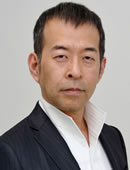
TEL : +81(0) 72 887 2560 / FAX : +81(0) 72 887 2561
[Tokyo-Office]1-24-7-408 Shinjuku Shinjuku-ku,Tokyo, 160-0022, Japan
TEL : +81(0) 3 5379 3733 / FAX : +81(0) 3 3353 6881
[KCM Ticket Service] +81(0) 570 00 8255
[KCM Artist Service] +81(0) 90 3727 6539
Welcome to KCM
News
KCM Ticket Service
Concert Schedule
Artist List
Artist News
CD-Recordings
KCM Archives
Concert Management
Osaka Club Series
Top Page
Hideto Ihara (Baritone)

Hideto Ihara, one
of the most remarkable young baritones, studied opera at the graduate
school of Osaka College
of Music. He pursued his study under the internship of the Agency of
Cultural Affairs of Japan. In 1999, he sang the leading role
Mizoguchi in Toshiro
Mayuzumi's opera "Kinkaku-ji" (conducted by Hiroyuki Iwaki
and directed by Masayoshi Kuriyama), which was presented at the Tokyo
Bunka
Kaikan Hall. His success with this difficult role gave him the Idemitsu
Music Award in 2000.
When Toshiro Mayuzumi's opera "Kinkaku-ji" was first performed
at the College Opera House in Osaka in 1997, it was the special performance
in memory of the composer, who had died earlier that year. This production,
which was performed by the same singers and orchestra as the one presented
in Tokyo in 1999, was hailed as a heroic attempt in the musical history
of Japan. It was recorded and broadcasted by NHK TV, and received the ABC
International Music Award, the Mitsubishi Trust Music Award, and the Osaka
Performing Arts Award. In 2000, Ihara appeared on the stage of the College
Opera House again, singing in Luigi Dallapiccola's "Il prigioniero".
This performance was also broadcasted by NHK TV nationwide, and his superb
performance and outstanding talent became widely recognized by Japanese
opera fans.
Following the success with "Il prigioniero", Ihara's career developed
rapidly. He sang Papageno in "Die Zauberflote" in the fifth anniversary
of the Yokosuka Arts Theater, Frank and Fritz for the Tokyo premiere of
Erich Wolfgang Korngold's "Die tote Stadt" of the subscription
concert of the New Japan Philharmonic. He was the baritone soloist for
the Japan premier of Krzysztof Penderecki's "Seven Gates of Jerusalem" under
the composer's baton and with the Osaka Philharmonic Orchestra. Also, he
was a soloist for Beethoven's "Ninth Symphony" and Verdi's "Requiem" with
the Asia Philharmonic Orchestra led by Chung Myung-Whun in Japan and
Korea.
In 2002 and 2003, Hideto Ihara was highly acclaimed by his superb performance
of singing a series of leading roles in the productions including Tchikovsky's "Eugene
Onegin", which was a co-production of the Mariinsky Theatre of Russia
and the Kansai Opera of Japan, Akira Miyoshi's "Tsunenaga Hasekura
- Toi-Ho" in the Kanagawa International Arts Festival, and the world
premier of Toshi Ichiyanagi's "Hikari" at the New National
Theater in Tokyo. He has become one of the most sought-after artists
for modern
opera works.
Hideto Ihara's opera repertoires include, in addition to the above, Le
nozze di Figaro, Cosi fan tutte, Die Zauberflote, Don Giovanni, Il barbiere
di Seviglia, Die Verschworenen, La Traviata, Carmen, Die Fledermaus, Die
lustigen Weiber von Windsor, Hansel und Gretel, Orphee aux enfers, La Boheme,
Madama Butterfly, Il tabarro, Le villi, Die Dreigroschenoper, Onatsu and
Seijuro, and Orpheus of Hiroshima. Also, Ihara is a frequent soloist for
Beethoven's Ninth Symphony and religious music by Bach, Handel, Mozart,
Rossini, Faure, Verdi, Puiccini, and Durufle.
Hideto Ihara was awarded with Idemitsu Music Award, Muramatsu Award, Kobe
City Cultural Award, Kobe Nada Lions Club Music Award, Matsukata Hall Music
Award, Blue Mail Award, ABC Music Award, and Crystal Award.
Hideto Ihara is teaching at Doshisha Women's College.
(C) Kojima Concert Management
(KCM) All Rights Reserved